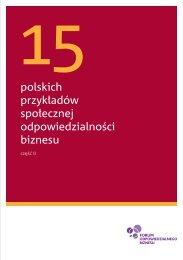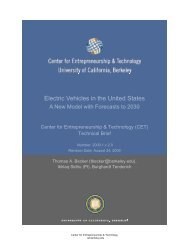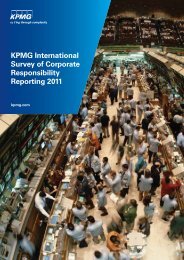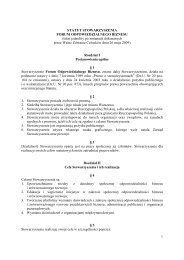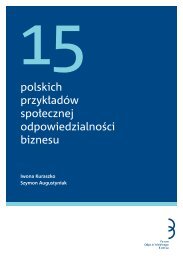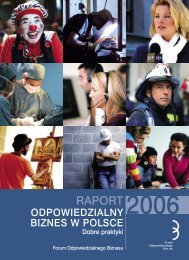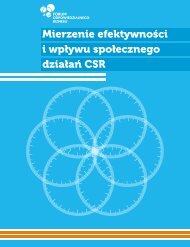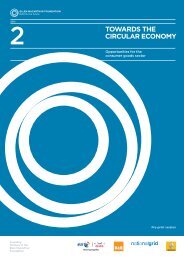Corporate Sustainability Disclosure in Emerging Markets
Corporate Sustainability Disclosure in Emerging Markets
Corporate Sustainability Disclosure in Emerging Markets
You also want an ePaper? Increase the reach of your titles
YUMPU automatically turns print PDFs into web optimized ePapers that Google loves.
<strong>Corporate</strong> <strong>Susta<strong>in</strong>ability</strong> <strong>Disclosure</strong> Practices <strong>in</strong> Emerg<strong>in</strong>g <strong>Markets</strong>generally far more likely to report and are often under greater pressure to do so. However,some basic trends emerged.Coverage: In the study SIF published <strong>in</strong> January 2008, researchers analyzed publicdisclosures of 75 companies at the end of September 2007. They selected the top fourcompanies <strong>in</strong> three sectors by float-adjusted market capitalization from the S&P/IFCI Indexfrom the seven largest countries <strong>in</strong> the <strong>in</strong>dex—Brazil, Ch<strong>in</strong>a, India, Russian Federation, SouthAfrica, South Korea and Taiwan. Also, <strong>in</strong> one case, a company was excluded because it wasa hold<strong>in</strong>g company. The 2008 report focused on only three sectors—energy (oil & gas);materials (metals and m<strong>in</strong><strong>in</strong>g) and telecommunications. In some countries there werefewer than four companies <strong>in</strong> one of the sectors chosen for analysis. In Taiwan, forexample, there was only one energy company listed. In these cases, researchers did notmake substitutions and analyzed fewer companies for these countries.For the second study, conducted by EIRIS and published <strong>in</strong> March 2009, researchers chose auniverse comprised of the largest four companies by market capitalization from 10 largeemerg<strong>in</strong>g market countries—Brazil, Ch<strong>in</strong>a, India, Indonesia, Israel, South Korea, Malaysia,Mexico, Russian Federation and South Africa. Although the universe is considerably smaller,country and company selection for the March 2009 study was similar to this current reportbased on UNCTAD data.Indicators: All three reports have somewhat dist<strong>in</strong>ctive criteria for company evaluation.For the January 2008 report, researchers asked whether each company:• Had any public disclosure of ESG issues?• Published a separate section of its website and/or annual report address<strong>in</strong>gsusta<strong>in</strong>ability issues?• Issued a current (with<strong>in</strong> the last two years) and stand-alone susta<strong>in</strong>ability report?• Referenced the Global Report<strong>in</strong>g Initiative (GRI) framework for its stand-alonereport?• Reported susta<strong>in</strong>ability goals and benchmarks?Meanwhile, the March 2009 report looked at a wide range of ESG criteria, <strong>in</strong>clud<strong>in</strong>gcompany disclosures on GHG emissions and other climate change <strong>in</strong>dicators, biodiversity,human rights, supply cha<strong>in</strong> metrics, health and safety, bribery and ethics, and boardpractices.F<strong>in</strong>d<strong>in</strong>gs: The key takeaways from the January 2008 report were:• An impressive 87 percent of the companies <strong>in</strong> the sample made some susta<strong>in</strong>abilitydisclosures.• Just more than half of the 75 companies published a stand-alone susta<strong>in</strong>abilityreport.• Only 27 percent of the companies made reference to the GRI report<strong>in</strong>g framework <strong>in</strong>their reports.• Of the three sectors reviewed, energy had the best overall disclosure, lead<strong>in</strong>g theother sectors <strong>in</strong> four of the five disclosure questions.• Of the seven countries analyzed <strong>in</strong> the report, South Africa led <strong>in</strong> disclosure, whileCh<strong>in</strong>a had the greatest room for improvement.22 - Copyright © 2009 Social Investment Forum, Wash<strong>in</strong>gton, DC




